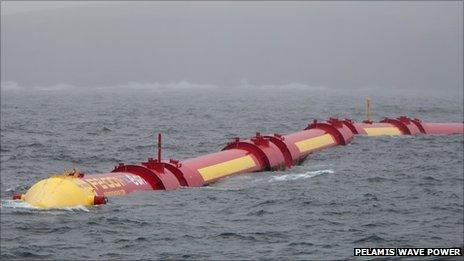Osborne unveils £103m renewables funding for Scotland
- Published
- comments

The money is to be invested in onshore and offshore renewable projects
Chancellor George Osborne has announced an extra £103m of funding for renewable energy in Scotland.
The money from the Fossil Fuel Levy was additional to the Scottish government's budget, but within the UK's overall spending plans and contingencies.
Scotland's Finance Secretary John Swinney said the funds were "long-awaited" but welcome.
Accompanied by Chief Secretary to the Treasury Danny Alexander, Mr Osborne made the announcement in Easter Ross.
Friends of the Earth Scotland has also welcomed the new deal, but said it was a "small part" of a larger effort to reduce carbon emissions and the would be a challenge in spending the money appropriately.
The UK and Scottish governments have reached an agreement on accessing funds from the Fossil Fuel Levy, a tax paid by suppliers of non-renewable energy sources.
It currently holds about £206m.
Under the deal, £103m will go towards Scottish renewable energy projects, including wave and tidal schemes.
The remaining £103m will be made available to support the capitalisation of the £3bn UK-wide Green Investment Bank.
Mr Osborne said the UK government was committed to creating jobs across Scotland - particularly in the green energy sector.
He said: "It's great news that we have been able to cut through the arguments and the wrangling with the Scottish government that have stopped this money being invested in the past.
"It shows how serious the UK government is in its support for Scotland's green future."
Mr Alexander added: "The UK government is strongly committed to supporting the growth of this sector in Scotland in the long term."
The Scottish government has been calling for money to be released from the Fossil Fuel Levy, which is held by Ofgem, so investments can be made in onshore and marine renewable projects.
Mr Swinney said: "For too long Scotland's money has been sitting unspent in an Ofgem account in London."
He added: "Scotland has the natural renewables resources to become the green energy powerhouse of Europe using all forms of renewables including hydro, wave, tidal, onshore and offshore wind."
Mr Osborne made the announcement at a former oil rig construction yard at Nigg which is set to become a service hub for the energy industry, employing an estimated 2,000 people by 2015.
Per Hornung Pedersen, chief executive officer of Edinburgh-based developer Pelamis Wave Power, said the funding was a welcome boost.
George Osborne says he hopes the money can create "centres of employment and growth" in Scotland
He said: "Wide scale commercial deployment of marine renewables will be delivered by substantial high-value manufacturing activity.
"Pelamis Wave Power are currently planning for the serial production of Pelamis wave energy machines and we welcome the confidence this sort of support brings.
"The majority of the capital expenditure involved in the manufacture of a Pelamis machine is currently spent in the UK, and all the design, fabrication, and assembly of our machines is done in Scotland - so we are well aware of the potential economic opportunity in this sector."
Francis Stuart, Friends of the Earth Scotland's policy officer, said the money had been a long time coming, but was welcome.
He added: "The challenge now will be to ensure that it is used in the best and most appropriate ways, to support Scotland's vast renewable potential, and help fund a just transition to a low carbon economy in Scotland.
"While this funding will make a welcome contribution to progress towards meeting Scottish and UK carbon reduction targets, it is still a small part of the overall picture."
He said the Scottish government needed to significantly increase investment in energy efficiency and demand reduction measures.
- Published25 October 2011
- Published20 October 2011
- Published20 October 2011
- Published12 October 2011